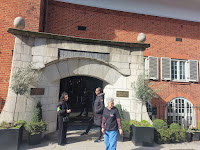William Heinemann first edition - 1973
I already have a biography of Mrs. Humphry Ward (see Blog of 28th December, 2022) but saw this on the Internet for £5 and swooped. It is a much slighter book than John Sutherland's and it skates over certain less positive aspects of the Ward family. Both biographers acknowledge their debt to Mrs. Mary Moorman, granddaughter of Mrs. Humphry Ward, but Sutherland, writing just four years' before her death, may have been given a freer rein. Enid Jones also paid tribute to the support of other family members. She lived in Mary Ward House, where her husband was first Principal of the National Institute for Social Work Training. I read Jones' biography on the train to and from London last week (an appalling experience - the journey not the reading). Walking from St. Pancras to the bookshops of Marchmont Street, I turned off my usual route to go down Tavistock Place to view and take photographs of the building, still a leading Conference Centre and Exhibition Venue. Mary (Mrs. Humphry) Ward would surely be proud and delighted that, 100 years' after her death, her project was alive and thriving.
In the March sunshine
Jones is capable of useful insight: The bonds of Mary Ward's life, at forty-six, were now inescapable: wife, mother, society hostess, lady of the big house, modern philanthropist, and always inexhaustibly the writer, driven surely by an inner compulsion as well as by financial need. In her self-image she was a woman of letters who spared time for good works. Yet it was through her good works, perhaps, that her more permanent creations would emerge. and did not spare her subject: A reader who finds his way today [1973]...is astonished that serious critics once admired Mrs Humphry Ward as a mistress of English prose. There is the occasional shrewd phrase, the nostalgic descriptive passage like those minor Victorian landscapes seen today in a Bond Street window, and judged 'rather nice'. Manuscripts and printed drafts are evidence of laborious revision and abridgement; didactic passages are sacrificed, whole episodes are dropped...even in her most splendid period the slovenliness of the great slogger leaves open pot-holes in the macadam of her prose. She did not write by ear...characters are built up from their social externals...Mary Ward's contemporaries liked her style; if they complained, it was of her didacticism, her characterization, and ultimately of her values.
However, one needs to go to John Sutherland for a more rounded version of Mary's life and the effect of her father's self-centredness and near-cruelty of her as a young girl - he gets off lightly in Jones' account; of her husband's sponging on her for decades, to finance his picture-buying near mania; of her son's selfish mediocrity; of her own constant battle with ill-health (sometimes psychosomatic but mostly real).
I have a contemporary newspaper review of Jones' biography - by one Stephen Corrin. He regards it as an excellent short life, (presenting) a fascinating picture of the high-minded do-gooder (who) wrote those heavily didactic novels, all of them so solidly earnest as to "relieve their readers from any reproach of wasting their time on trifles"...her unique subject, whom she aptly describes as a "shrewd organiser of the kingdom of heaven on earth." Well, that's not a bad epitaph.



No comments:
Post a Comment